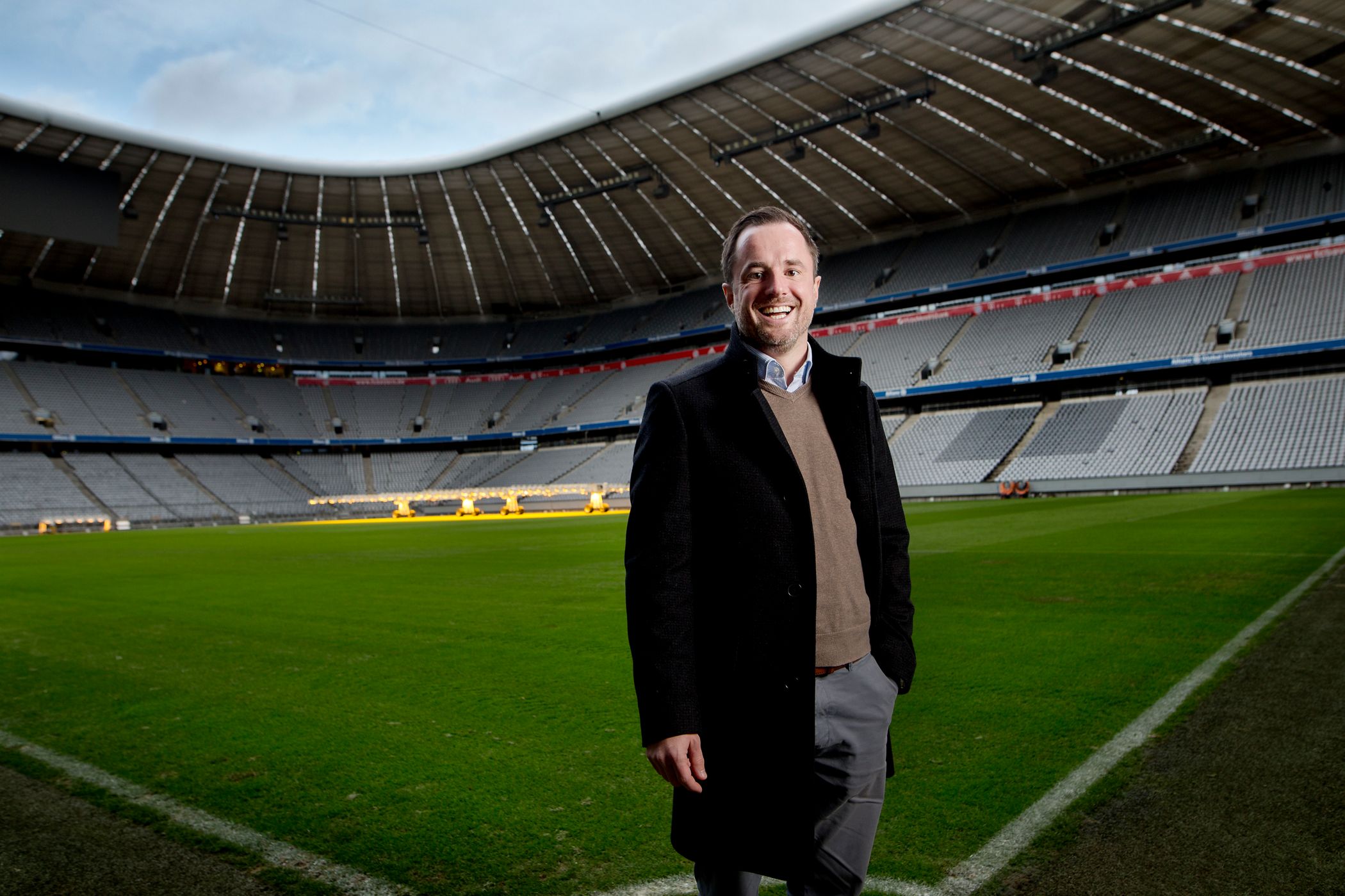High-tech soccer experience
With 75,000 spectators, the atmosphere soon gets electric when FC Bayern Munich wins on home turf. But did you know that the arena is one of the most high-tech in the world?
On the outskirts of Munich, with the Alps towering in the distance, you find the home of FC Bayern Munich. When filled, the Allianz Arena holds a total of 75,000 spectators, and indeed it was packed the night before our interview when visiting FC Köln lost 1-0 against the star-studded home team. Now, the grandstands are empty once again.
“We are an industrial company. Usually, we work with turbines, engines and such,” says Sebastian Wolf, Marketing Manager for MindSphere at Siemens.
He holds court for a small group of journalists, and the sanguine German is conscious of the attention.
“Who had thought a few years ago that the technology department at Siemens and FC Bayern Munich would join forces to watch the grass grow?”

their cooperation with Allianz Arena can make the soccer experience even better for the fans. Photo: Anita Arntzen
High-tech stadium
For millions of Bayern Munich fans, the Allianz Arena is more than just a stadium. It’s a temple, a stronghold, and a place where both hopes and dreams are embodied by 11 men in shorts. For a region that has been described as Europe’s Silicon Valley, Bavaria’s soccer stadium has always been a step ahead in terms of technological solutions.
For 75,000 spectators to reach the arena in a safe and convenient way, traffic in the area is managed centrally from a control centre inside the arena. Before the match, they keep a watchful eye on the traffic volume, using remote-controlled traffic signs to help travellers avoid the worst queues. Even the arena’s exterior is high-tech. It consists of 2,874 inflated rhomboidal ETFE foil panels that are kept under constant air pressure. The panels are illuminated by over 300,000 LED lights that can produce 16 million different colour shades.
Siemens has been working with Bayern Munich and Allianz Arena for years, contributing to many of these innovations. After signing a new deal as Bayern Munich’s ‘Global Performance Partner’, cooperation will be taken a step further after the upcoming season.
“It’s not just about technology anymore, it’s about how we manage the technology,” Wolf says.
Sensors in the grass
MindSphere is a Cloud-based operating system from Siemens designed to collect, store and analyse large amounts of data in real time. For Bayern Munich, MindSphere will primarily be used for something quite unexpected.
“We will place sensors in the grass!”
Wolf talks about MindSphere and the great opportunities that the technology promises:
“It’s like a plane,” he says.
But since it’s by no means obvious what the grass at Allianz Arena has in common with an aircraft, Wolf elaborates further:
“It’s like a plane in a way because you’d prefer to know that an engine is about to fail before it actually happens. It’s common for other industries to have sensors. You have sensors in engines, in turbines, in pumps. Here, we can have sensors to measure how much the grass is growing and to measure pH values and moisture and temperatures levels. We work with the greenkeeper to find out what’s useful so we can collect information using one and the same application.
Allianz Arena has a total capacity of 75,000 spectators
More data, greater insight
FC Bayern Munich’s greenkeeper, Christian Dinauer, says he has sleepless nights when the grass isn’t in perfect condition. Wolf believes that MindSphere can help.
The greenkeeper is a passionate guy, he walks around on the grass, he smells and tastes it, and he knows exactly how he wants it to be. But he cannot predict the future. However, we will try to help him gaze into the crystal ball as far as possible by collecting and analysing a large amount of information from the pitch.
Just the beginning
“For example, the club has a challenge when the match is over and all spectators want to go home at the same time. Then there is a lot of traffic and the metro gets overcrowded. What if you could take this information and send it directly to the FC Bayern Munich app that people download to their smartphones?
And why stop there?
For example, with MindSphere, you can combine traffic information with offers from commercial partners. Wolf envisions spectators on their way home receiving discount coupons along with congestion warnings on their phones.
“People will get notified by their phones: ‘If you wait here for ten minutes before you go to the metro, then you’ll get home as quickly as you would by queuing up now – and you’ll get a 20 percent discount on a beer’.” This is an example of something that would be possible if we link all the individual technologies we already have.
Teamwork
Football is about turning 11 players into the best possible team. Skilful individual players can achieve a lot, but usually the winner is the team that works best together. This may also be the case with technology, and the idea is that MindSphere can help connect single technologies and turn them into a team. Wolf believes many of tomorrow’s solutions lie in the technology we already have.
“The more we develop the technology, the more we interconnect things, the more opportunities we get!”